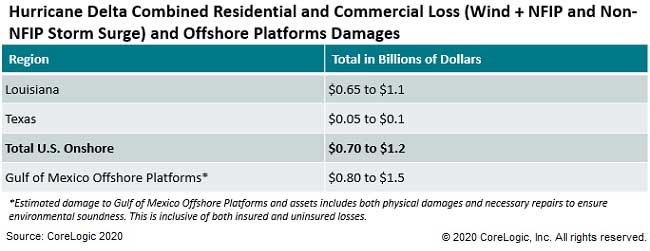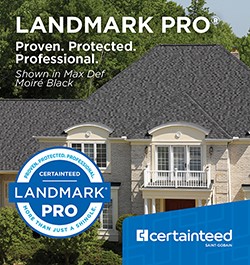CoreLogic Estimates $0.7 Billion to $1.2 Billion in U.S. Onshore Losses From Hurricane Delta Wind and Storm Surge

$0.8 to $1.5 billion additional damage from offshore waves; Weeks after Hurricane Laura made historic landfall, Hurricane Delta presents homeowners with the potential for double-jeopardy.
CoreLogic® (NYSE: CLGX), a leading global property information, analytics and data-enabled solutions provider, today announced residential and commercial storm surge and wind loss estimates for Hurricane Delta. According to this new data analysis, insured wind losses for residential and commercial properties in Louisiana and Texas are estimated to be between $0.5 billion and $0.9 billion. Insured storm surge losses are estimated to be an additional $0.2 billion to $0.3 billion. Damage to offshore structures ranges from $0.8 billion to $1.5 billion.
Hurricane Delta made landfall near Creole, Louisiana, on Friday, October 9, as a mid-Category 2 storm with a maximum sustained surface wind speed of 100 miles per hour, making Delta the second hurricane in six weeks to make landfall along the southwestern coast of Louisiana. As Hurricane Delta approached the western Louisiana coast, the storm encountered an environment of high wind shear and weakened just before landfall in Cameron Parish, about 15 miles east of where Hurricane Laura devastated communities in late August.
“Recovery from Hurricane Delta will likely be exacerbated due to ongoing rebuilding efforts following Hurricane Laura,” said Tom Larsen, principal, insurance solutions at CoreLogic. “Damage from Hurricane Laura extended inland and concentrated on roofs and exterior building cladding, and Delta’s impact could have a double-jeopardy impact. For homeowners, it is critical to work hand-in-hand with insurers to understand their coverage and financial responsibility.”
Insurance Considerations
Hurricane insurance: In 2009, Louisiana passed legislation mandating a single annual hurricane deductible for homeowners. It is expected that most insured homes with damage from the two hurricanes in 2020 – Laura and Delta – will be subject to only a single hurricane deductible unless a homeowner has changed insurance carriers between storms. Louisiana is one of many states in the U.S. with insurance policies that include hurricane deductibles larger than the standard deductible on the policy. In most states, deductibles are occurrence-based, and a policyholder will be obligated to potentially pay a second deductible for a second event in the same calendar year. Hurricane deductibles in Louisiana are activated when the National Hurricane Center (NHC) reports a tropical storm has reached hurricane strength at 74 miles per hour.
Flood insurance: While homeowners insurance covers wind damages, it typically excludes flood damages. The predominant insurer of flood coverage of homes in Louisiana is the National Flood Insurance Program (NFIP) which is federally regulated. The NFIP policy is a loss-occurrence-based policy and these two storms are expected to be treated as separate flood events.
Damage Estimates
The CoreLogic post-landfall estimates are based on the October 11, 8 p.m. Eastern Daylight NHC advisory of the storm. The analysis examines onshore losses for residential homes and commercial properties and incorporates contents and business interruption, but does not include broader economic loss from the storm. A separate analysis estimates the impact to offshore oil and gas facilities.

Visit the CoreLogic natural hazard risk information center, Hazard HQ, at www.hazardhq.com to get access to the most up-to-date Hurricane Delta storm data and see reports from previous storms. Also, order your next roof report at SkyMeasure™, a property measurement service provided by CoreLogic that offers a new level of accuracy, simplicity and affordability.
Methodology
CoreLogic offers high-resolution location information solutions with a view of hazard and vulnerability consistent with the latest science for more realistic risk differentiation. The high-resolution storm surge modeling using 10m digital elevation model (DEM) and parcel-based geocoding precision from PxPoint™ facilitates this realistic view of risk. Residential structures of up to four units, including single-family homes, mobile homes, duplexes, manufactured homes and cabins (among other non-traditional home types) are included in this analysis. Multifamily residences are also included. This is not an indication that there will be no damage to other types of structures.
Source: CoreLogic
The data provided are for use only by the primary recipient or the primary recipient's publication or broadcast. This data may not be resold, republished or licensed to any other source, including publications and sources owned by the primary recipient’s parent company without prior written permission from CoreLogic. Any CoreLogic data used for publication or broadcast, in whole or in part, must be sourced as coming from CoreLogic, a data and analytics company. For use with broadcast or web content, the citation must directly accompany first reference of the data. If the data is illustrated with maps, charts, graphs or other visual elements, the CoreLogic logo must be included on screen or website. For questions, analysis or interpretation of the data, contact newsmedia@corelogic.com. Data provided may not be modified without the prior written permission of CoreLogic. Do not use the data in any unlawful manner. This data is compiled from public records, contributory databases and proprietary analytics, and its accuracy is dependent upon these sources.
About CoreLogic
CoreLogic (NYSE: CLGX), the leading provider of property insights and solutions, promotes a healthy housing market and thriving communities. Through its enhanced property data solutions, services and technologies, CoreLogic enables real estate professionals, financial institutions, insurance carriers, government agencies and other housing market participants to help millions of people find, buy and protect their homes. For more information, please visit www.corelogic.com.
Learn more about CoreLogic by visiting their RCS Directory.
CORELOGIC, the CoreLogic logo, PxPoint and Hazard HQ are trademarks of CoreLogic, Inc. and/or its subsidiaries. All other trademarks are the property of their respective owners.

















-2025-xtv-mls-tour-2.png)





Comments
Leave a Reply
Have an account? Login to leave a comment!
Sign In